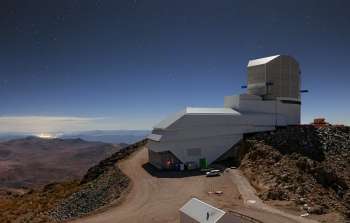sci25016 — Announcement
Center for Decoding the Universe Annual Conference: Data-Driven Discovery in the Rubin Era
May 6, 2025
You are invited to register for Data-Driven Discovery in the Rubin Era, a conference to be held June 5-6 at Stanford. This is the inaugural annual conference of the Center for Decoding the Universe, a joint initiative of Stanford Data Science and the Kavli Institute for Particle Astrophysics and Cosmology (KIPAC). The conference is designed to be interdisciplinary and discussion-focused, including a half-day “unconference” session. Registration is free, and we invite abstract submissions for short talks or posters by 12 May.
Please see details below, and please feel free to share widely with your networks.
Vision:
From anomaly detection in massive data sets and foundation models that compactly describe multi-modal data, to simulation-based inference that bridges the gap between the observed and simulated Universe, new methodologies will enable new insights from large and complex datasets. These new approaches are poised to impact the next big thing in astrophysics: data from the NSF–DOE Vera C. Rubin Observatory’s Legacy Survey of Space and Time (LSST). This meeting will gather leading researchers in astrophysics, AI/ML, data science, and statistics, and will identify new opportunities for inference and data-driven discovery with the imminent LSST data.
Structure:
With time devoted to small group discussion and half a day of unconference, the two-day conference is designed to promote discussion about the hard questions and methodological innovations that will be especially relevant in the upcoming large astronomical data era. Three sessions that combine an astronomical subfield with a data science/AI methodology will focus on (i) anomaly detection with applications to variable and transient science, (ii) astronomical foundation models and applications to galaxy evolution, and (iii) simulation-based inference including applications to cosmology. Each session will be introduced by three speakers who will together (1) outline the current state of the astronomical field, emphasizing major open questions that LSST data could help address, (2) provide a broad overview of the methodology, covering recent advances while highlighting existing limitations that may hinder its full potential when applied to astronomical data, and (3) pose challenging questions about the methodology’s applicability and effectiveness in addressing open astronomical questions compared to traditional approaches.
Following the introductory session, participants will break into small group discussions, followed by group-wide report-backs. There will be contributed talks and posters in each session to enable presentation of recent work. The half-day unconference on the second day is designed to foster further discussion and collaborative problem-solving, allowing small groups to explore potential answers and solutions to the questions raised in the three sessions.
For more information about the event and to register, visit this page.
Risa Wechsler
for the organizing committee: Tom Abel, Dalya Baron, Jo Ciuca, Susan Clark, Surya Ganguli, Sanmi Koyejo, Phil Marshall
About the Announcement
| Id: |
ID
sci25016
|
